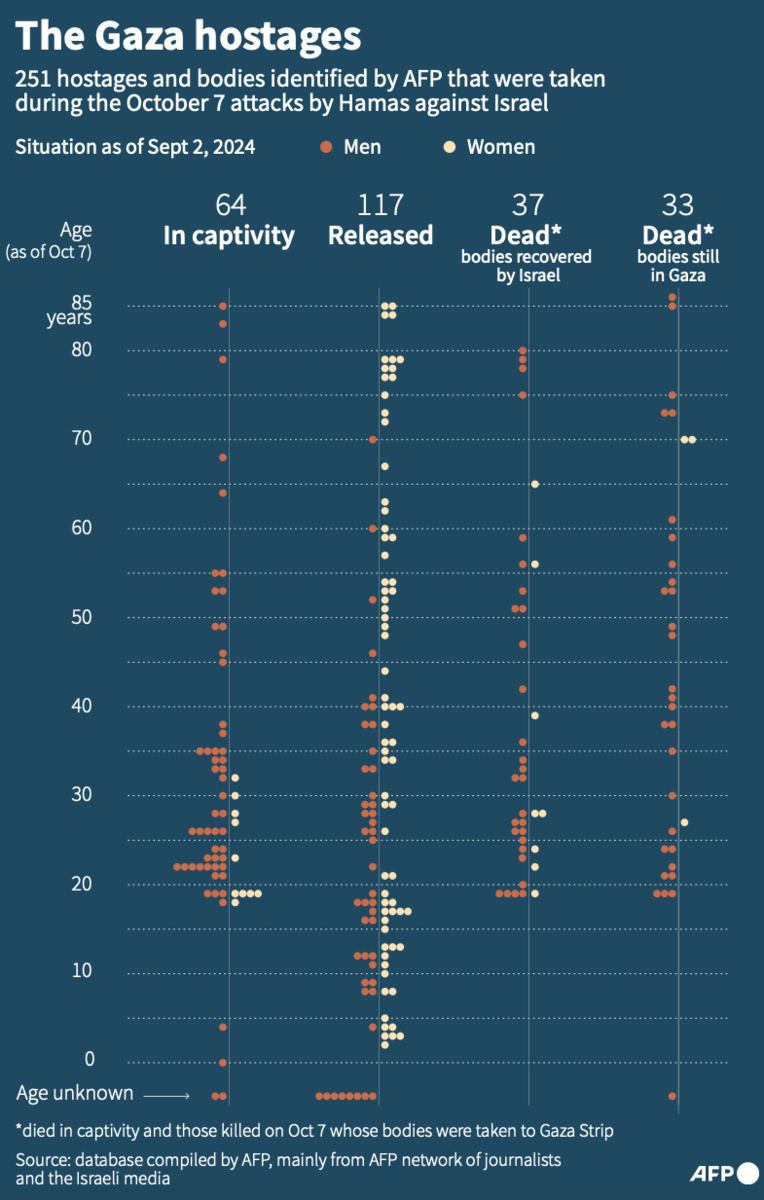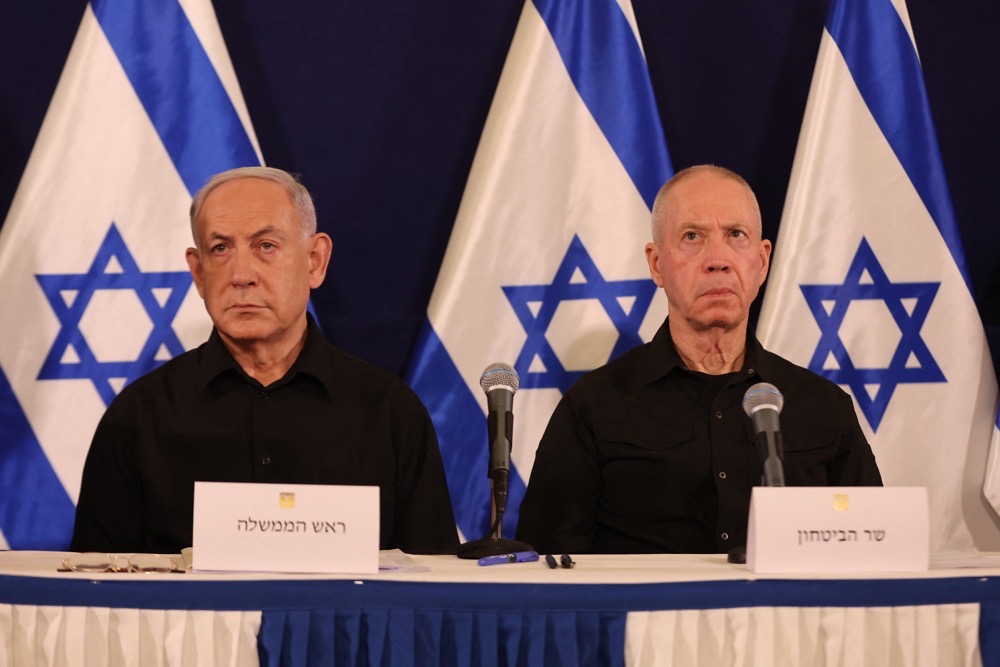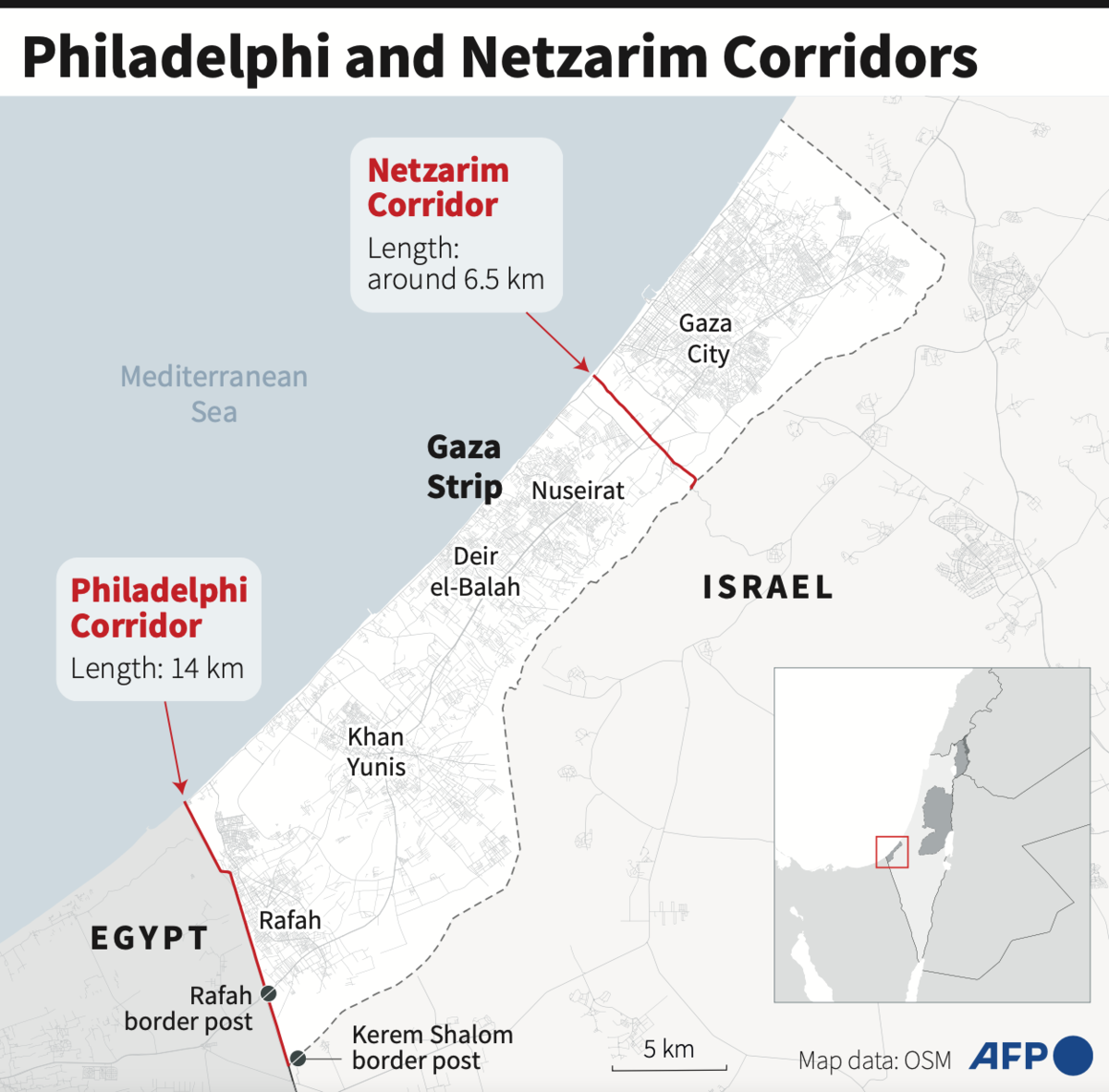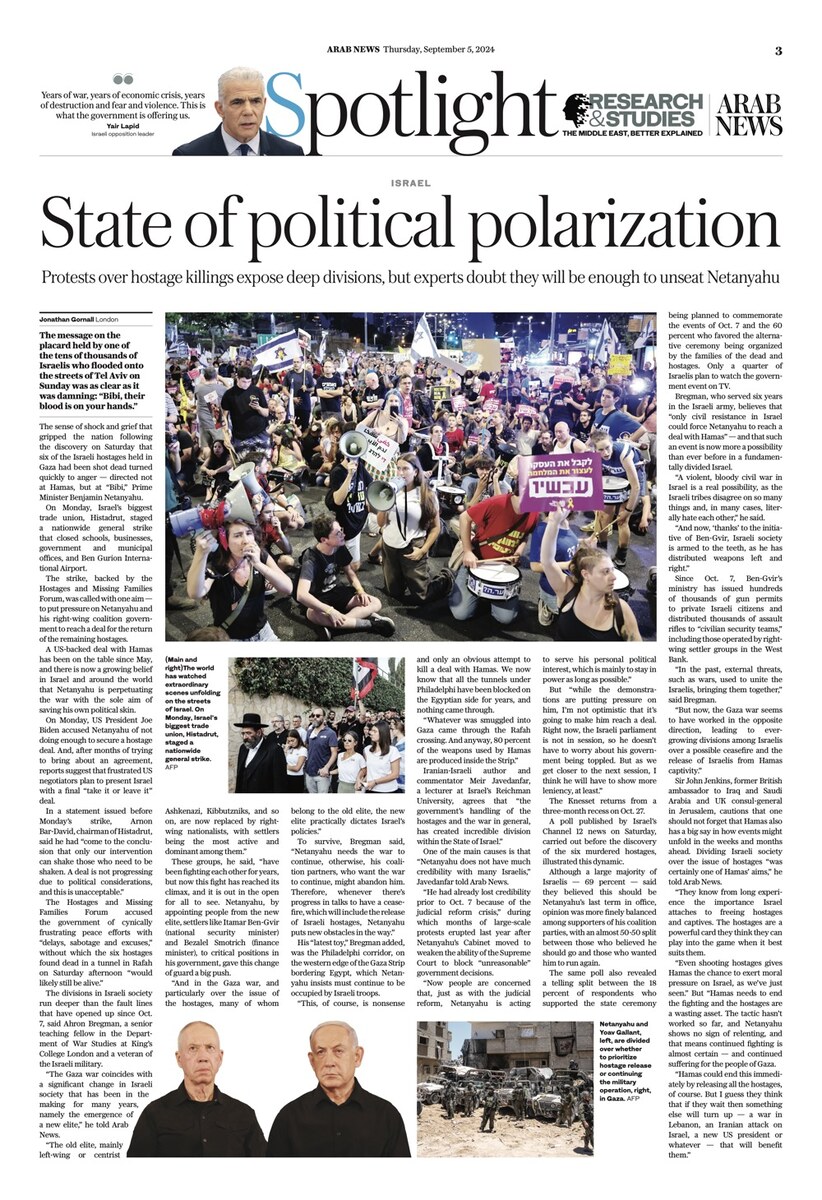LONDON: The message on the placard held by one of the tens of thousands of Israelis who flooded on to the streets of Tel Aviv on Sunday was as clear as it was damning: “Bibi, their blood is on your hands.”
It is rare for any country at war to experience internal dissent on the scale of the protests that have convulsed Israeli society this week — let alone the state of Israel, whose citizens are famously patriotic.
But the sense of shock and grief that gripped the nation following the discovery on Saturday that six of the Israeli hostages held in Gaza had been shot dead turned quickly to anger — directed not at Hamas, but at “Bibi,” Prime Minister Benjamin Netanyahu.
The world has watched extraordinary scenes unfolding on the streets of Israel.

Relatives of Israeli hostage Edan Alexander speak during a demonstration by the families. (AFP/File)
At mass protests in Tel Aviv, speakers calling for a peace deal shared a stage with six coffins draped in the Israeli flag. Outside Netanyahu’s residence in Jerusalem a peaceful sit-down demonstration was broken up by police.
On Monday, Israel’s biggest trade union, Histadrut, staged a nationwide general strike that closed schools, businesses, government and municipal offices, and Ben Gurion International Airport.
The strike, backed by the Hostages and Missing Families Forum, was called with one aim — to put pressure on Netanyahu and his right-wing coalition government to reach a deal for the return of the remaining hostages.
A US-backed deal with Hamas has been on the table since May, and there is now a growing belief in Israel and around the world that Netanyahu is perpetuating the war with the sole aim of saving his own political skin.
On Monday, US President Joe Biden accused Netanyahu of not doing enough to secure a hostage deal. And, after months of trying to bring Israel and Hamas to an agreement, reports suggest that frustrated US negotiators plan to present Israel with a final “take it or leave it” deal.
In a statement issued before Monday’s general strike, Arnon Bar-David, the chairman of Histadrut, said he had “come to the conclusion that only our intervention can shake those who need to be shaken. A deal is not progressing due to political considerations, and this is unacceptable.”

The world has watched extraordinary scenes unfolding on the streets of Israel. (AFP)
The traumatized relatives of the Hostages and Missing Families Forum accused the government of cynically frustrating peace efforts with “delays, sabotage and excuses,” without which the six hostages found dead in a tunnel in Rafah on Saturday afternoon “would likely still be alive.”
The divisions in Israeli society run deeper than the fault lines that have opened up since Oct. 7, said Ahron Bregman, a senior teaching fellow in the Department of War Studies at King’s College London and a veteran of the Israeli military.
“The Gaza war coincides with a significant change in Israeli society that has been in the making for many years, namely the emergence of a new elite,” he told Arab News.
“The old elite, mainly left-wing or centrist Ashkenazi, Kibbutzniks, and so on, are now replaced by right-wing nationalists, with settlers being the most active and dominant among them.”

Dividing Israeli society over the issue of hostages “was certainly one of Hamas’s aims,” Sir John Jenkins told Arab News. (AFP)
These groups, he said, “have been fighting each other for years, but now this fight has reached its climax, and it is out in the open for all to see. Netanyahu, by appointing people from the new elite, settlers like Itamar Ben-Gvir (national security minister) and Bezalel Smotrich (finance minister), to critical positions in his government, gave this change of guard a big push.
“And in the Gaza war, and particularly over the issue of the hostages, many of whom belong to the old elite, the new elite practically dictates Israel’s policies.”
To survive, Bregman said, “Netanyahu needs the war to continue, otherwise, his coalition partners, who want the war to continue, might abandon him. Therefore, whenever there’s progress in talks to have a ceasefire, which will include the release of Israeli hostages, Netanyahu puts new obstacles in the way.”

His “latest toy,” Bregman added, was the Philadelphi corridor, on the western edge of the Gaza Strip bordering Egypt, which Netanyahu insists must continue to be occupied by Israeli troops.
“This, of course, is nonsense and only an obvious attempt to kill a deal with Hamas. We now know that all the tunnels under Philadelphi have been blocked on the Egyptian side for years, and nothing came through.
“Whatever was smuggled into Gaza came through the Rafah crossing. And anyway, 80 percent of the weapons used by Hamas are produced inside the Strip.”
Iranian-Israeli author and commentator Meir Javedanfar, a lecturer at Israel’s Reichman University, agrees that “the government’s handling of the hostages and the war in general, has created incredible division within the State of Israel.”

Israel says it is conducting a military campaign in Gaza to eliminate Hamas and rescue hostages. (AFP)
One of the main causes is that “Netanyahu does not have much credibility with many Israelis,” Javedanfar told Arab News.
“He had already lost credibility prior to Oct. 7 because of the judicial reform crisis,” during which months of large-scale protests erupted last year after Netanyahu’s cabinet moved to weaken the ability of the Supreme Court to block “unreasonable” government decisions.
“Now people are concerned that, just as with the judicial reform, Netanyahu is acting to serve his personal political interest, which is mainly to stay in power as long as possible.”

Israeli Prime Minister Benjamin Netanyahu, left, and Defence Minister Yoav Gallant. (AFP)
But “while the demonstrations are putting pressure on him, I’m not optimistic that it’s going to make him reach a deal. Right now, the Israeli parliament is not in session, so he doesn’t have to worry about his government being toppled. But as we get closer to the next session, I think he will have to show more leniency, at least.”
The Knesset returns from a three-month recess on Oct. 27.
Chris Doyle, director of the Council for Arab-British Understanding, says it is important to remember that in Israel “there is a consensus and support for Israeli attacks on Hamas and that the government does have a mandate to go after them.”
Opinion
This section contains relevant reference points, placed in (Opinion field)
Doyle told Arab News: “The opposition to Netanyahu is far more about the man than the policy against Hamas. Where a lot of these protesters differ with Netanyahu and his coalition is that they would have put the survival and the return of the hostages above politics, which is actually a strong tradition within Israel’s history.
“But if you look at the polling, there isn’t actually a lot of antipathy and opposition toward the actual conduct of the war amongst Israeli Jews. So the difference is, who’s prepared to pay a price in negotiations to get the hostages back, and who’s not?”

Displaced Palestinians returning to Bani Suhayla and neighbouring towns east of Khan Yunis in July, 2024. (AFP)
On Wednesday CAABU was one of 18 UK charities and NGOs that signed a joint statement welcoming the British government’s decision to suspend some arms licenses to Israel, but called for it to go further and “immediately end ALL arms transfers to Israel to prevent their use in violations of international law.”
“Yes, the demonstrations are large, but they are in the more liberal Israeli Jewish cities, such as Tel Aviv, and not in the more conservative right-wing ones,” Doyle said.
“Netanyahu is Israel’s longest-serving prime minister. I disagree with him politically and morally, but in terms of Israeli politics he is a superb political operator.
“I thought that in the immediate aftermath of Oct. 7 he would have to go, because of the colossal failure on his watch. But one underestimates him at one’s peril. He is a survivor, he’s very obstinate and not somebody who is going to give up. He would have to be forced out.
“He knows that these protesters aren’t the people who support him, or are ever likely to. So what would finish Netanyahu is not protests, but more likely any rifts within his coalition.”

A poll published by Israel’s Channel 12 news on Saturday, carried out before the discovery of the six murdered hostages, illustrated this dynamic.
Although a large majority of Israelis — 69 percent — said they believed this should be Netanyahu’s last term in office, opinion was more finely balanced among supporters of his coalition parties, with an almost 50-50 split between those who believed he should go and those who wanted him to run again.
The same poll also revealed a telling split between the 18 percent of respondents who supported the state ceremony being planned to commemorate the events of Oct. 7 and the 60 percent who favored the alternative ceremony being organized by the families of the dead and hostages. Only a quarter of Israelis plan to watch the government event on TV.

The traumatized relatives of the Hostages and Missing Families Forum accused the government of cynically frustrating peace efforts. (AFP)
Bregman, who served six years in the Israeli army, believes that “only civil resistance in Israel could force Netanyahu to reach a deal with Hamas” — and that such an event is now more a possibility than ever before in a fundamentally divided Israel.
“A violent, bloody civil war in Israel is a real possibility, as the Israeli tribes disagree on so many things and, in many cases, literally hate each other,” he said.
“And now, ‘thanks’ to the initiative of Ben-Gvir, Israeli society is armed to the teeth, as he has distributed weapons left and right.”
Since Oct. 7, Ben-Gvir’s ministry has issued hundreds of thousands of gun permits to private Israeli citizens and distributed thousands of assault rifles to “civilian security teams,” including those operated by right-wing settler groups in the West Bank.
“In the past, external threats, such as wars, used to unite the Israelis, bringing them together,” said Bregman.

“But now, the Gaza war seems to have worked in the opposite direction, leading to ever-growing divisions among Israelis over a possible ceasefire and the release of Israelis from Hamas captivity.”
Sir John Jenkins, former British ambassador to Iraq and Saudi Arabia and UK consul-general in Jerusalem, cautions that one should not forget that Hamas also has a big say in how events might unfold in the weeks and months ahead.
Dividing Israeli society over the issue of hostages “was certainly one of Hamas’s aims,” he told Arab News.
“They know from long experience the importance Israel attaches to freeing hostages and captives. The hostages are a powerful card they think they can play into the game when it best suits them.
“Even shooting hostages gives Hamas the chance to exert moral pressure on Israel, as we’ve just seen.”

“Only civil resistance in Israel could force Netanyahu to reach a deal with Hamas,” said Ahron Bregman. (AFP)
But “Hamas needs to end the fighting and the hostages are a wasting asset. The tactic hasn’t worked so far, and Netanyahu shows no sign of relenting, and that means continued fighting is almost certain — and continued suffering for the people of Gaza.
“Hamas could end this immediately by releasing all the hostages, of course. But I guess they think that if they wait then something else will turn up — a war in Lebanon, an Iranian attack on Israel, a new US president or whatever — that will benefit them.”





























